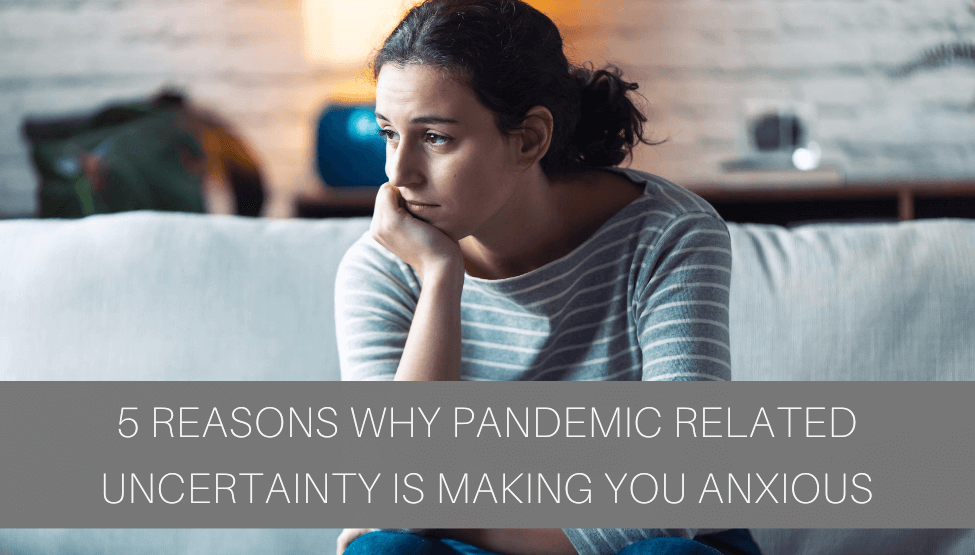From the early days of the COVID-19 outbreak the information surrounding the virus and how best to prevent it has been overwhelming. How infectious is it? Who is most at risk? How is it transmitted? These are common questions with uncertain answers. It’s this uncertainty that has many people living with daily anxiety during the pandemic.
Here are 5 Reasons Why Pandemic Related Uncertainty Is Making You Anxious.
1. You Lose Confidence in Your Decisions
Reading conflicting information and receiving differing guidance daily can cause anxiety. And that anxiety can leave you questioning your ability to make even the simplest decisions. In the Forbes article Have Decision-Making Anxiety? Overcome it With These 16 Tips, Dan Hawkins advises people struggling with decision-making anxiety to “surround yourself with people who have different experiences and perspectives. Allow for a healthy debate where all points are heard, then decide and commit.”
2. You Start Procrastinating
People procrastinate for a variety of reasons, but uncertainty related to the COVID-19 pandemic makes procrastination more enticing. When you’re presented with so many decisions and so much information about each decision, it’s tempting to delay making any decision at all. But as the article How to Prevent Anxiety From Causing Procrastination notes, “Putting things off may temporarily make you feel better, but in the long run, it will most likely add more stress and anxiety to your life.”
3. You Become a Micromanager
Sharie Stines Psy. D., states in a Psych Central article about micro-managing, “The root cause of micromanagement is anxiety.” In an effort to regain some control it’s tempting to refuse to delegate tasks to the people around you and even force others to change in an effort to make their actions more predictable. But the end result is often more anxiety for everyone involved.
4. You Use Worrying as a Coping Tool
Worrying is a way we cope with uncertainty. By trying to predict the future in order to avoid unexpected surprises, what you’re really trying to do is find a solution. If it’s kept in check, worrying can actually be helpful. “Worry is a way for your brain to handle problems in order to keep you safe,” Dr. Luana Marques, an associate professor of psychiatry at Harvard Medical School told the New York Times. “It’s only when we get stuck thinking about a problem that worry stops being functional.”
5. Your Fight or Flight Response Is Triggered
Completing even the most basic daily living tasks during the pandemic is fraught with safety concerns. The Forbes article The Psychology of Uncertainty: How to Cope With COVID-19 Anxiety tells us, “When certainty is questioned, your stress response goes haywire, instantly arousing your fight-or-flight reaction, kicking you in the pants in an attempt to spur you to action and get to safety.” The uncertainty tied to COVID-19 leaves many of us stuck in a perpetual state of heightened anxiety: great for survival but bad for your mental health.
To help maintain your mental health during the pandemic, Susan Stutzman and Fernando Gonzalez, child therapists at Kid Matters Counseling explain Why the COVID-19 Pandemic is So Difficult & Ways to Thrive.
———————————————————-
If you or a family member are experiencing pandemic related anxiety or any type of anxiety, check out our online anxiety resources or schedule an appointment with one of our therapists.
Jessica Korzyniewski contributed to this article.
New Clients Call: (855) 586-1802
Current Clients: (855) 543-7687
Ask Us Anything!
We help anxious kids and frustrated parents. We serve Hinsdale & the Western Suburbs of Chicago.
Made with ♥︎ in Hinsdale, Illinois for Chicago
Built By Brand Your Practice.
Kid Matters Counseling, P.C. DISCLAIMER: This website and blog are for informational, educational and general discussion purposes only. It is understood that no guarantee or warranty arises from the information provided, discussed or commented upon in this website and blog nor does it constitute legal or other professional advice on any subject matter. Access to this website and blog is voluntary and at the sole risk of the user. If you think that you have a medical emergency (including clinical), call your doctor or 911 immediately. A licensed medical professional should be consulted for diagnosis and treatment of any and all medical conditions. While the information contained within this website and blog is periodically updated, no guarantee is given that the information provided is correct, complete, and/or up-to-date. See our complete Privacy Policy and Terms of Service.





